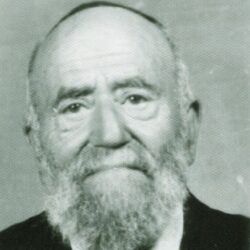 Rabbi Daniel Solomon Ẓion (דניאל שלומו ציון; 1883–1979) born in Salonica, was an Orthodox rabbi, ḳabbalist, and political activist. Ẓion moved to Sofia, Bulgaria, as a shoḥet, ḥazzan. Bulgaria's Jewish community at the time was almost completely assimilated, and there were no ultra-Orthodox communities in the country during World War II. In May 1943, alongside Chief Rabbi Dr. Asher Hananel (1895–1964), Ẓion helped prevent the deportation of nearly 50,000 Jews from Sofia. They did so by appealing to the Metropolitan Bishop of Sofia, Metropolitan Stefan, then head of the Bulgarian Orthodox Church in Sofia. (Bishop Stefan then appealed to Tsar Boris III.) On 24 May 1943, Rabbi Ẓion addressed a gathering at a synagogue, then participated in a mass street demonstration against the anti-Jewish Law for protection of the nation. This law was in effect between 23 January 1941 to 27 November 1944. Two days after the demonstration, Zion was arrested among many others. Having previously enjoyed refuge under the protection of Bishop Stefan, he was transported to a concentration camp for Jews at Somovit, on the bank of the Danube. After the war, Communist interests appointed Ẓion as Chief Rabbi of Sofia. In 1949, Ẓion immigrated to Jaffa in the newly formed state of Israel. Not long after his arrival in Israel, Rabbi Ẓion was accused of having an interest in the mystical Christian movement founded by the Bulgarian religious philosopher, Peter Deunov (1864-1944). On 13 June 1950, an Israeli periodical reported that the then Chief Ashkenazi Rabbi of Tel Aviv, Rabbi Isser Yehuda Unterman (1946-1964), had interviewed Sefaradi Jews who knew Zion personally. A panel of Israeli rabbis ruled that Ẓion was mentally ill and removed him from the rabbinical court in Jaffa. Despite being removed from the rabbinical court, Zion was interviewed on 14 September 1952 by Kol Yisrael Radio, the Israeli national radio station and expressed his view that Jesus fulfilled the various messianic prophecies. Ẓion further claimed that he served as the president of the Union of Messianic Jews in Israel (Ichud Yehudim Meshihiim Be-Yisrael), an organization founded by Abram Poljak. The Israeli newspaper Herut ran a detailed piece on Daniel Ẓion in 1960 that highlighted his insistence that he was not a Christian convert and that he opposed Jewish assimilation. Ẓion continued to serve as a rabbi for Bulgarian Jews until 1973. Filter resources by Category Filter resources by Tag Filter resources by Collaborator Name Filter resources by Language Filter resources by Date Range
Contributed by:
Aharon N. Varady (digital imaging and document preparation), Daniel S. Ẓion (translation) A bilingual, nusaḥ Sefaradi, Hebrew-Bulgarian prayerbook compiled by Rabbi Daniel Solomon Ẓion (1883-1979) in 1946 after being appointed chief rabbi of Sofia, and before his 1949 immigration to the then new State of Israel. . . .
|

